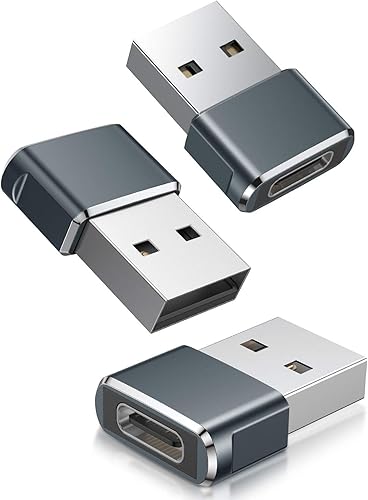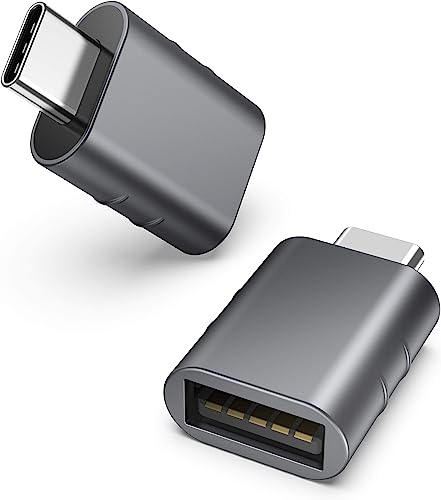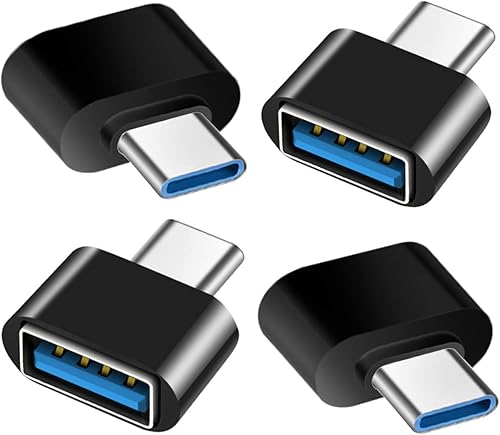How to Choose a USB-C to USB Adapter in 2025? Guide and Comparison
The USB-C to USB adapter has become an essential tool for connecting devices using traditional USB ports to modern devices equipped with USB-C ports. The importance of choosing this accessory wisely lies in its implications for transfer speed, hardware compatibility, and durability. As our devices continue to evolve, the USB-C to USB adapter is the gateway that allows the continuity and versatility of our technological equipment.
Our TOP 3
BASESAILOR

Pros
- Good build quality
- Convenient for converting USB cables
- Good value for money
Cons
- Not compatible with video outputs
Specs
Syntech

Pros
- Compact and aesthetic
- USB 3.0 functionality
- Good durability
Cons
- Limited to devices requiring up to 4.5 watts
Specs
Selection Criteria
Compatibility
Ensure that the USB-C to USB adapter is compatible with your devices. Some adapters are specifically designed to work with particular operating systems like Windows, macOS, or Linux, and some might even restrict compatibility with certain smartphone and tablet models. Check the product's technical specifications to ensure maximum compatibility.
Transfer Speed
The data transfer rate is another crucial factor. USB-C to USB adapters can support different transfer standards, such as USB 2.0, USB 3.0, and even USB 3.1 or USB 3.2, allowing speeds of up to 10 Gbps for the latest standards. Choose an adapter that offers at least a speed compatible with your devices to optimize performance.
Build Quality
Opt for an adapter made from high-quality materials. Gold-plated connectors, for instance, provide better corrosion resistance and ensure stable connectivity. A reinforced cable, often braided in nylon, will also increase your adapter's durability by protecting it from frequent bends and twists.
Additional Features
Some adapters offer additional features such as fast charging support (power delivery), which allows charging devices while transferring data. Others may include multiple ports to connect several devices simultaneously. These features can add significant value to your purchase.
Common Mistakes
Overlooking the Transfer Standard
A common mistake is not paying attention to the transfer standard supported by the adapter. Using a USB 2.0 adapter on a USB 3.0 device will result in reduced and suboptimal transfer speed.
Hardware Incompatibility
Purchasing an adapter without checking the specific requirements of your device often leads to incompatibility. This may result in unrecognized devices or malfunction.
Comparison of our 3 favorite products
BASESAILOR- Aluminum alloy adapter for durability

The BASESAILOR stands out for its surgical-grade aluminum alloy construction, offering excellent durability and compatibility with various USB-A devices. Its colorful design matches well with your modern gadgets. It is a trusted choice for those who want to avoid the hassle of repeated plugging thanks to its ability to stay connected without issue.
Pros
- Optimal durability thanks to aluminum alloy
- Convenient for keeping permanently connected
- Good value for money
Cons
- Does not support video outputs
Syntech- Minimalist design and high durability

Syntech offers a unique combination of minimalist design and functionality with its USB-C to USB adapter. Designed for demanding users, it supports up to 10,000 plug-ins, ensuring its longevity. It is particularly appreciated for its sleek aesthetic and its ability to transform USB-C ports into classic USB without driver installation.
Pros
- Refined aesthetic with non-slip design
- Compatible with a wide range of devices
- Built to last with high durability (up to 10,000 uses)
Cons
- Does not provide sufficient power for devices over 4.5 watts
Mepsies- Economical solution with a pack of 4 adapters

Mepsies provides a practical and economical approach to USB-C conversion with its pack of four adapters. These are designed for those looking to cover multiple needs in different locations, such as home, office, and on the go. Although robust, its plastic body may not offer the same strength as its metal competitors.
Pros
- Economical and practical for diverse uses
- Easy to carry and use
- Good value for money
Cons
- Sturdiness varies among users
- Occasional compatibility issues
Practical Tips
Opt for Recognized Brands
Renowned brands often offer better warranty and effective customer service. Although they may be more expensive, branded products generally ensure superior quality and durability.
Check User Reviews
Feedback from other users can provide valuable insights into the actual performance of the adapter. Look at online reviews to choose a product that will effectively meet your needs.
FAQ
See also: